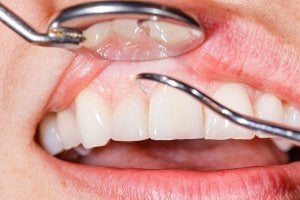 Gum disease is a common oral health problem that can cause damage to teeth and gums. As widespread as this condition is, though, consistent oral hygiene can largely prevent you from suffering from it. Your brushing and flossing sessions, as well as regular dental cleanings by a dentist near Schaumburg, can help you enjoy healthy gums for a lifetime and avoid these gum disease complications:
Gum disease is a common oral health problem that can cause damage to teeth and gums. As widespread as this condition is, though, consistent oral hygiene can largely prevent you from suffering from it. Your brushing and flossing sessions, as well as regular dental cleanings by a dentist near Schaumburg, can help you enjoy healthy gums for a lifetime and avoid these gum disease complications:
Receding Gums
Plaque buildup is normally the initial cause of gum disease . When bacteria have the chance to feed upon food particles and create acidic byproducts, these substances cling to tooth enamel and harden onto it. In response, the gums may become inflamed, and this inflammation eventually causes them to recede from the gumline. As gum tissue continues to pull back from tooth enamel, it leaves teeth vulnerable to additional plaque accumulation that can foster infection and tooth decay.
Tooth Loss
Without professional gum disease treatment from a dentist, receding gums can evolve into missing teeth. As gum tissue becomes weaker and less able to fortify teeth, you might notice your teeth beginning to shift in your mouth. In some cases, they may even fall out, or your dentist may need to extract them. Once tooth loss occurs, restoration of your smile would likely require dental implants or dentures.
Cardiovascular Disease
Heart disease is one of the most pressing health issues in the United States, and many healthcare providers see a connection between this problem and gum disease. When gum disease is severe, the bacteria causing it can eventually enter the affected gums and the blood vessels supplying nutrients to them. Once in the bloodstream, these bacteria can continue to trigger tissue inflammation. This side effect of gum disease could potentially increase your risk of a future heart attack, heart failure, or stroke. However, making sure that you regularly go to your dental office can safeguard you from these life-threatening issues. During your dental cleanings, your dentist can remove plaque that may be causing gum inflammation and recession to help you keep your smile free from gum disease.
Reference: www.prevention.com

